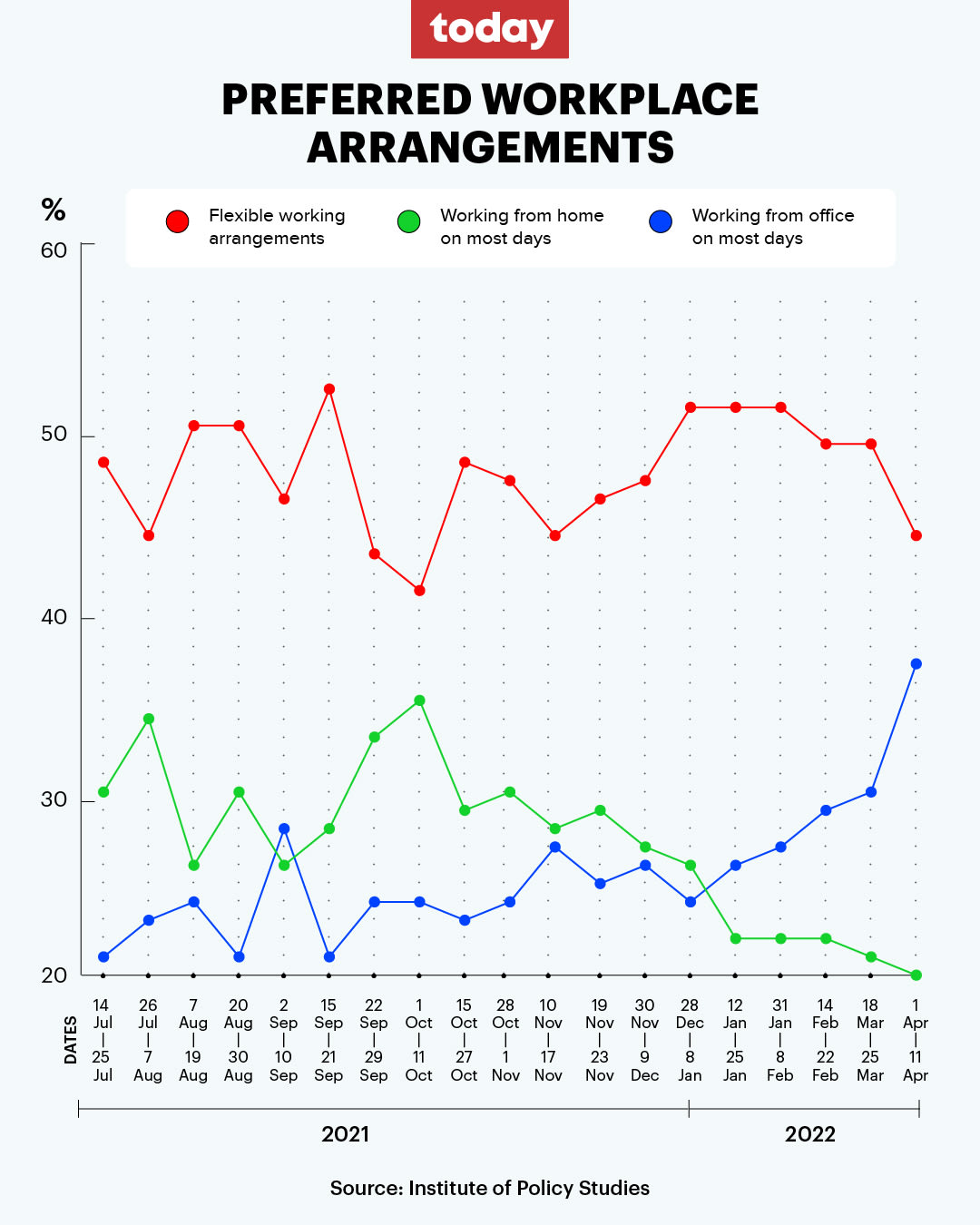Fewer people prefer working from home on most days but attitudes hardening among those who do: IPS survey

Read also
The study stated that the increase in preference for working from the office coincided with the easing of community safe management measures announced on March 24, which allowed a greater percentage of employees to return to the workplace."This suggests that there has been a shift in attitudes towards living with Covid-19 as more employees return to the office, and as Covid-19 case numbers come under control," the study stated.
However, for those who are working from home and prefer to continue doing so, more have indicated that they would consider changing jobs if working from the office becomes the default.
Respondents were asked if they would consider looking for another job if their employer requires them to return to office on most days.
During the period between Dec 28 last year and Feb 22, 37 per cent of respondents faced with this prospect said that they would consider looking for another job, but among those surveyed from March 18 to April 11, when there was a further relaxation of Covid-19 measures, this figure grew to 42 per cent.
Elaborating on the results at a media briefing on Monday, principal research fellow and head of IPS Social Lab Mathew Mathews said the findings show increasingly that employees who have adapted well to working from home would want these flexible work arrangements to continue.
Read also
"There is a lot of interest, at least locally, for employees who want to find employers who would feel that it's important for employees to have this kind of flexibility," he said.Read also
The study, led by Dr Mathews, was also co-authored by Ms Phoa, associate director of IPS Social Lab Mike Hou, and research associate Elizabeth Lim.Other findings in the study include:
MORE WOMEN PREFER TO WORK FROM HOME THAN MEN
- The study showed that around 73 per cent of female respondents preferred to work from home on most days or have flexible work arrangements, compared to 66 per cent of male respondents who felt this way
- For women with dependants, 94 per cent preferred to work from home on most days or have flexible work arrangements, while the figure for men was 86 per cent
- "The differential gendered preferences for work arrangements in the new norm possibly reflects how females continue to be burdened with the lion share of domestic care work," read the study
- Dr Mathews said that there is "quite a bit to juggle" for mothers with young children who have to still go back to the workplace regularly
- He added that while it would help women in such situations if they were granted more workplace flexibility, "it would also help men to get more involved with the care responsibilities and caregiving roles".
THOSE WITH CAREGIVER DUTIES PREFER FLEXIBLE WORK ARRANGEMENTS
- Respondents with aged persons at home were more likely to feel that flexible work arrangements should be the new norm for workplaces (52 per cent) as compared to those with children (44 per cent) or those with both children and aged persons at home (37 per cent)
- "They may prefer the flexibility to arrange their work schedule around caregiving needs of the aged persons," the report said
- Those with children at home were more likely to feel that working from home on most days should be the new norm at workplaces (28 per cent) compared to those with aged persons (22 per cent) or those with both aged persons and children at home (25 per cent)
- However, more respondents with both children and aged persons at home also feel that working from the office on most days should be the new norm for workplaces (38 per cent) as compared to respondents with children (28 per cent) or respondents with aged persons at home (26 per cent).
- "One possible reason for this could be that aged persons at home might serve as a helpful resource for some families in the care of their children when respondents go to work," the study said
MORE RETURNING TO WORKPLACES AS RESTRICTIONS EASE
- The proportion of respondents who had to return to their workplaces on most days increased from 51 per cent at the start of the study in July last year to 74 per cent in April.
- Following the announcement of the easing of workplace management measures in March, the proportion of those returning to workplaces surged from 62 per cent at the end of March to 74 per cent in April
- However, through the course of the survey, some respondents felt "cajoled" to return to office
- Between 37 and 42 per cent of respondents who currently worked from home most or all of the time felt pressured to return to the office on most days. This figure has been "steadily decreasing," the study revealed.
- Despite the trend towards more workers returning to office on most days, Dr Hou, one of the paper's authors, said that the workplace should not revert to the pre-pandemic arrangement where "people mostly view the workplace as just a place where you go physically to perform work".
- "It should be seen as a place where coordination and collaboration thrive," he said.
- "That has implications on the physical set-ups of the office that (employers) would want to consider (such as for) increasing collaborations and team building in the kind of work that they do rather than simply have siloed spaces that people work in.
